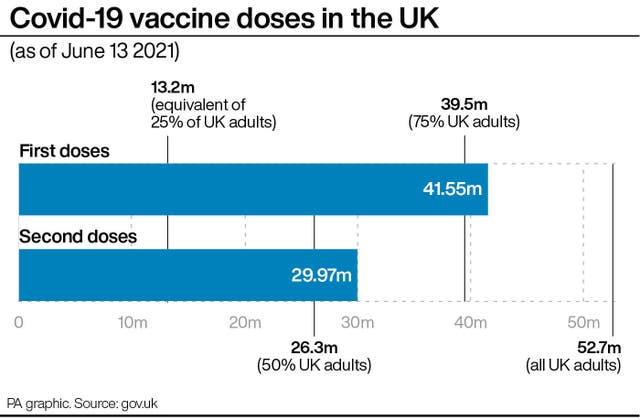Vaccine timeline accelerated as jabs open to those over 23
Protection against the Delta variant is highest among those who have had both jabs.

Delaying lockdown easing will give the NHS more time to deliver crucial Covid-19 jabs, Boris Johnson said as the timeline for Covid-19 vaccines was sped up.
The target of offering jabs to all adults by the end of July has been brought forward to July 19, with those over the age of 23 in England able to book their jab from tomorrow.
The delay will also mean that more people will be able to receive their second Covid-19 jab, with the Prime Minister announcing that all over 40s should have their second vaccination eight weeks after their first.
It is hoped that the delay for easing restrictions will mean that around two-thirds of adults will have been offered two doses of vaccine by July 19.
Health Secretary Matt Hancock said 1.3 million people who are over 50 and 4.5 million over 40s have so far had a first jab but not yet a second.
The vaccines offer the most protection after a person has received both doses.

Bringing forward the deadline for when all adults will receive their first dose suggests the entire adult population should have received both doses of the vaccine by October 11, which is 12 weeks after the new deadline.
It comes as a new PHE study found that unvaccinated people have twice the risk of hospital admission with the Delta variant as the Alpha variant.
Mr Johnson told a Downing Street briefing said that a delay could give the NHS “a few more crucial weeks to get those remaining jabs into the arms of those who need them”.
He said: “By Monday July 19, we will aim to have double jabbed around two thirds of the adult population including everyone over 50, all the vulnerable, all frontline health and care workers and everyone over 40 who received their first dose by mid-May.
“To do this we will now accelerate the second jabs for those over 40, just as we did for the vulnerable groups, so they get the maximum protection as fast as possible.
“And we will bring forward our target to give every adult in the country a first dose by July 19, that is including young people over the age of 18, with 23 and 24-year-olds invited to book jabs from tomorrow so we reduce transmission among groups that mix the most and to give the NHS that extra time.”
Sir Patrick Vallance, the Government’s chief scientific adviser, said: “If you take the week of July 19, all over-18s will have been vaccinated or offered the vaccine, then eight to 12 weeks later then everybody should have been double vaccinated in that age group, so that’s the sort of timescale.
“These vaccines are really highly effective against the Delta variant.
“One of the concerns we might have had at the beginning was they weren’t going to work as well – (the) first dose not quite so much but two doses are very effective.
“By getting more people over the age of 40 vaccinated, which protects those most likely to end up in hospital and get seriously ill, and giving all over-18s one dose, that will reduce spread because the single dose will put up another barrier to spread among the age group most likely to spread because they have more social contact.
“So, that is a sort of a double protection that should be in place over the next few weeks.”
A previous study by Public Health England (PHE) found that the Pfizer coronavirus vaccine is 88% effective against the variant first identified in India (the Delta variant) after two doses, compared with 93% efficacy against the variant first identified in Kent (the Alpha variant).
Meanwhile, the AstraZeneca jab was 60% effective, compared with 66% against the Alpha variant over the same period.
Both vaccines were 33% effective against symptomatic disease from the Delta variant three weeks after the first dose, compared with about 50% against the Alpha variant.
A separate PHE study found that Covid-19 vaccines are “highly effective” in preventing hospital admission with the Delta variant of coronavirus.
PHE’s study of hospital admissions found that the Pfizer/BioNTech vaccine is 94% effective against hospital admission after just one dose, rising to 96% after two doses.
And the Oxford/AstraZeneca vaccine is 71% effective against hospital admission after just one dose, rising to 92% after two doses.
Unvaccinated people have twice the risk of hospital admission with the Delta variant as the Alpha variant.
Protection against death is also expected to be high, but further work is underway to confirm this, PHE said.
The Prime Minister’s official spokesman said: “Spi-M modelling suggests if we were to go ahead with Step 4 on Monday there’s a possibility of hospitalisations around the peak of the first wave.
“But vaccine effectiveness especially after two doses means thousands more deaths can be prevented if people are jabbed.
“By reducing the dosing interval for over 40s from 12 weeks to eight weeks, all over 40s who received a first dose by mid-May will have been offered their second dose by week commencing July 19. By July 19 cohorts 1-9 will have been offered a second dose and over 18s will have been offered a first dose.
“This will mean around two-thirds of adults will have been offered two doses, reducing the risk of hospitalizations and deaths.”





